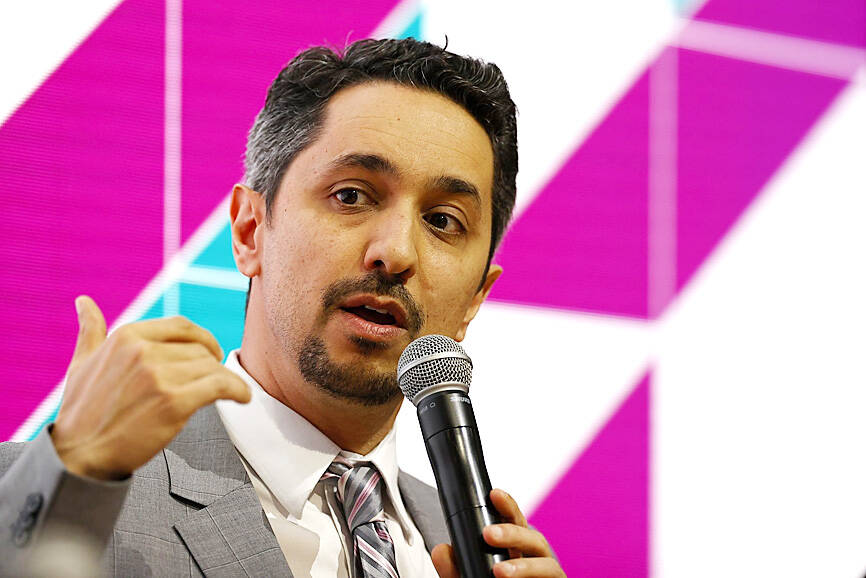Saudi Arabian Oil Co (Saudi Aramco) yesterday reported that profits jumped 46 percent last year, highlighting how a surge in oil prices after Russia invaded Ukraine spurred growth at the world’s biggest crude oil exporter.
Mostly state-owned Saudi Aramco, the world’s second-most valuable company behind Apple Inc, said in a filing with the country’s stock exchange that net income for last year was US$161.07 billion, up from US$110 billion in 2021.
The increase was “predominantly due to the impact of higher crude oil prices and volumes sold, and stronger refining margins,” it said.

Photo: Bloomberg
Saudi Aramco’s results are consistent with record profits for last year reported by the five oil majors — Shell PLC, Chevron Corp, ExxonMobil Corp, BP PLC and TotalEnergies SE — which surpassed US$150 billion and would have been closer to US$200 billion without costly withdrawals from Russia. They also fueled Saudi Arabia’s overall economic growth, which officials put at 8.7 percent last year, the highest rate in the G20.
The net income figure is nearly double the US$88.2 billion the firm reported for 2019, before the COVID-19 pandemic.
“Aramco rode the wave of high energy prices in 2022. It’s what the company is geared to do,” said Robert Mogielnicki, a researcher at the Arab Gulf States Institute in Washington. “It would have been difficult for Aramco not to perform strongly in 2022.”
Energy prices are expected to stay elevated this year, in part because of production cuts approved in October last year by the OPEC+ cartel, which Riyadh leads together with Moscow — an arrangement criticized by the US.
Saudi Aramco’s facilities have in the past suffered drone and missile attacks claimed by Yemen’s Iran-backed Houthi rebels, most recently about a year ago, but a surprise deal announced on Friday between Riyadh and Tehran to restore diplomatic ties severed in 2016 could mitigate the risk in the months to come.
“I don’t envision another record year for Aramco in 2023, but it could still be a solid performance,” Mogielnicki said.
Under Crown Prince Mohammed bin Salman, Saudi Arabia’s de facto ruler, the country has sought to open up and diversify its oil-reliant economy, spending heavily on much-hyped projects, such as a futuristic megacity known as Neom.
Officials have touted growth in non-oil activities, which increased 6.2 percent annually in the fourth quarter of last year, data published on Thursday by the Saudi Arabian General Authority for Statistics showed.
However, government spending “is a major driver for this growth” and that “will always be to some extent linked to oil revenue,” underscoring Aramco’s central role in the economy, Khalij Economics director Justin Alexander said.
Saudi Arabia has pledged to achieve net zero carbon emissions by 2060, drawing skepticism from environmental campaigners.
Officials are simultaneously championing further investments in fossil fuels to ensure energy security, and stave off inflation and other economic woes.
Saudi Aramco has pledged to achieve “operational net zero” carbon emissions by 2050. That applies to emissions that are produced directly by its industrial sites, but not carbon emitted when clients burn Saudi Arabian oil products in their vehicles, power plants and furnaces.

RUN IT BACK: A succesful first project working with hyperscalers to design chips encouraged MediaTek to start a second project, aiming to hit stride in 2028 MediaTek Inc (聯發科), the world’s biggest smartphone chip supplier, yesterday said it is engaging a second hyperscaler to help design artificial intelligence (AI) accelerators used in data centers following a similar project expected to generate revenue streams soon. The first AI accelerator project is to bring in US$1 billion revenue next year and several billion US dollars more in 2027, MediaTek chief executive officer Rick Tsai (蔡力行) told a virtual investor conference yesterday. The second AI accelerator project is expected to contribute to revenue beginning in 2028, Tsai said. MediaTek yesterday raised its revenue forecast for the global AI accelerator used

TEMPORARY TRUCE: China has made concessions to ease rare earth trade controls, among others, while Washington holds fire on a 100% tariff on all Chinese goods China is effectively suspending implementation of additional export controls on rare earth metals and terminating investigations targeting US companies in the semiconductor supply chain, the White House announced. The White House on Saturday issued a fact sheet outlining some details of the trade pact agreed to earlier in the week by US President Donald Trump and Chinese President Xi Jinping (習近平) that aimed to ease tensions between the world’s two largest economies. Under the deal, China is to issue general licenses valid for exports of rare earths, gallium, germanium, antimony and graphite “for the benefit of US end users and their suppliers

Dutch chipmaker Nexperia BV’s China unit yesterday said that it had established sufficient inventories of finished goods and works-in-progress, and that its supply chain remained secure and stable after its parent halted wafer supplies. The Dutch company suspended supplies of wafers to its Chinese assembly plant a week ago, calling it “a direct consequence of the local management’s recent failure to comply with the agreed contractual payment terms,” Reuters reported on Friday last week. Its China unit called Nexperia’s suspension “unilateral” and “extremely irresponsible,” adding that the Dutch parent’s claim about contractual payment was “misleading and highly deceptive,” according to a statement

Artificial intelligence (AI) giant Nvidia Corp’s most advanced chips would be reserved for US companies and kept out of China and other countries, US President Donald Trump said. During an interview that aired on Sunday on CBS’ 60 Minutes program and in comments to reporters aboard Air Force One, Trump said only US customers should have access to the top-end Blackwell chips offered by Nvidia, the world’s most valuable company by market capitalization. “The most advanced, we will not let anybody have them other than the United States,” he told CBS, echoing remarks made earlier to reporters as he returned to Washington